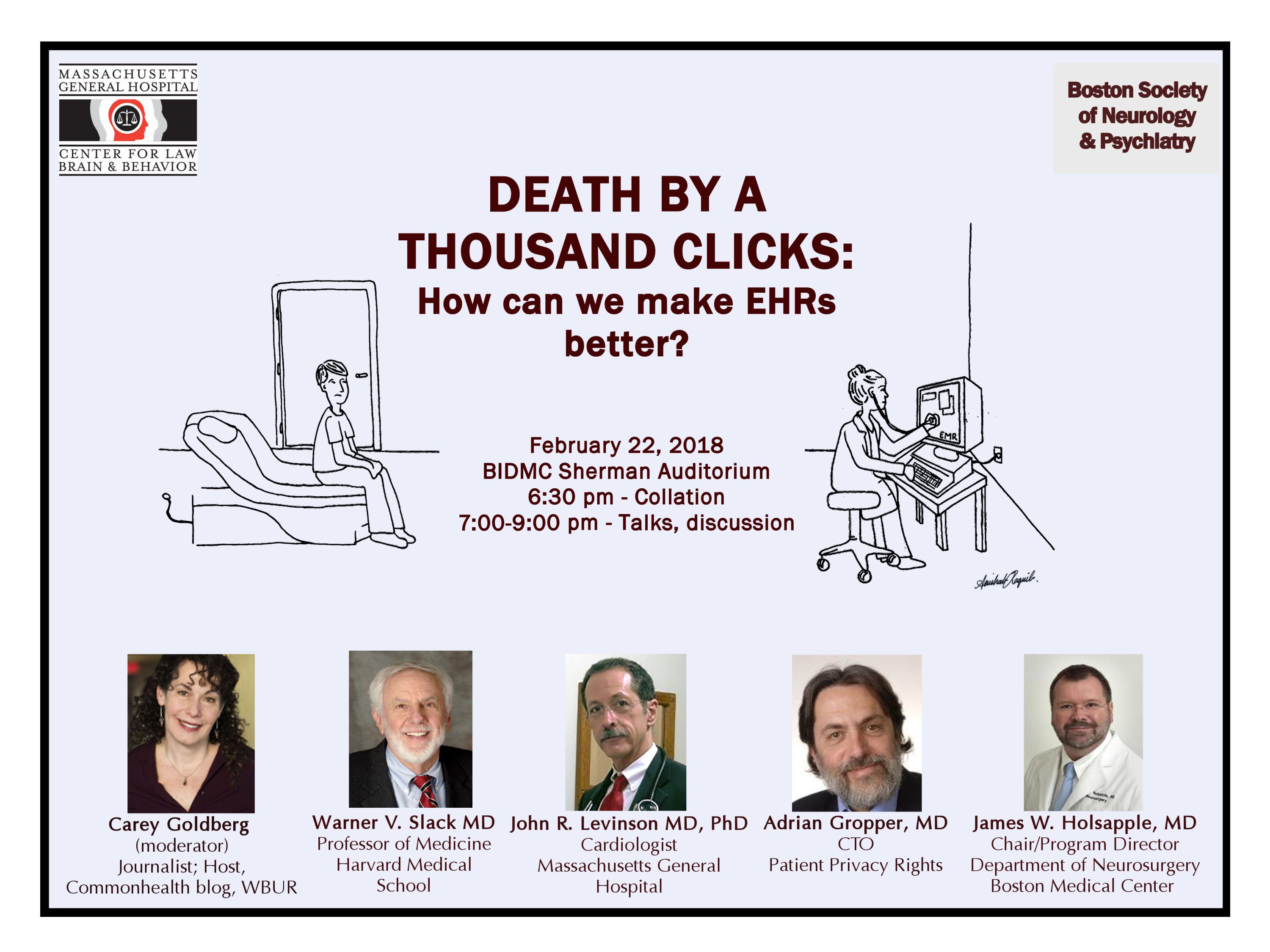
Date: February 22, 2018
Location: BIDMC’s Sherman Auditorium
Time: 6:30p collation; 7:00-9:00p talks and discussion
Participants: Carey Goldberg (moderator), Adrian Gropper, MD, James W. Holsapple, MD, John R. Levinson, MD, PhD, Warner V. Slack, MD

The Center for Law, Brain & Behavior puts the most accurate and actionable neuroscience in the hands of judges, lawyers, policymakers and journalists—people who shape the standards and practices of our legal system and affect its impact on people’s lives. We work to make the legal system more effective and more just for all those affected by the law.

Date: February 22, 2018
Location: BIDMC’s Sherman Auditorium
Time: 6:30p collation; 7:00-9:00p talks and discussion
Participants: Carey Goldberg (moderator), Adrian Gropper, MD, James W. Holsapple, MD, John R. Levinson, MD, PhD, Warner V. Slack, MD
Concentrated poverty is on the rise, and an increasing number of children are at risk for exposure to severe violence and dangerous living conditions. What are the implications of trauma exposure for healthy brain development?
During this panel event, Dr. Kerry Ressler (of McLean Hospital and Harvard Medical School) will discuss the risks poor, urban environments pose for post-traumatic stress disorder, while Dr. Charles A. Nelson (of Boston Children’s Hospital and Harvard Medical School) will discuss the effects of “toxic stress” on early childhood development. Carey Goldberg of WBUR will facilitate the conversation and host the Q&A session with the audience.
This event will be held on Thursday, March 24, 2016, at the Brigham and Women’s Hospital, Bornstein Amphitheater, from 7:00-8:30 pm.
Make sure to RSVP before the event!
This event is free and open to the public. A brief reception will precede the event from 6:30-7:00 PM.
The gap between the scientific community and the public is widening. Whether considering climate change or mental health, policymakers and gatekeepers of the legal system routinely mischaracterize scientific consensus, with potentially devastating consequences for the moral health of our society and our collective future. It’s never been more crucial to examine how public understanding of science can be transformed – through better storytelling, deeper dialogue among disciplines, and the simple art of persuasion – and also how science can be better informed (and guided) by the ongoing needs of society.
On Friday, January 23, 2015 at the Norton’s Woods Conference Center of the American Academy of Arts & Sciences in Cambridge, CLBB presented “Translation 2.0: A Forum on Transforming Public Understanding of Science.” Leading thinkers from science, the law, and journalism discussed the art of persuasion (F. Lee Bailey), the successful OpEd (Nancy Gertner), writing a sophisticated science story (Carey Goldberg), new models for disrupting public opinion (Jeff Howe), and why science needs storytelling (Jordan Smoller). Remarks from each speaker were followed by a lively discussion among all attendees around how both scientists and journalists – as well as the public at large – can do more to speak each other’s languages and address key consensus issues. Continue reading »
By Carey Goldberg | WBUR CommonHealth | August 7, 2014
(part of the Brain Matters series)
The final installment of WBUR’s Brain Matters series featured work from two CLBB faculty, Joshua Buckholtz and Joshua Greene. The tDCS research by Buckholtz discussed below was made possible through a grant from CLBB’s Law and Neuroscience Pilot Fund program, which supports scientists to engage in innovative research at the interface of neuroscience and the law.
Harvard brain scientist Joshua Buckholtz has never forgotten a convict he met back when he was an undergrad conducting psychological tests in prisons. The man had beaten another man nearly to death for stepping on his foot in a dance club.
“I wanted to ask him,” he recalls, “‘In what world was the reward of beating this person so severely, for this — to me — minor infraction, worth having terrible food and barbed wire around you?’ ”
But over the years, Buckholtz became convinced that this bad deed was a result of faulty brain processing, perhaps in a circuit called the frontostriatal dopamine system. In an impulsive person’s brain, he says, attention just gets so narrowly focused on an immediate reward that, in effect, the future disappears. Continue reading »